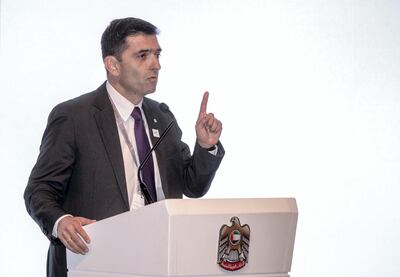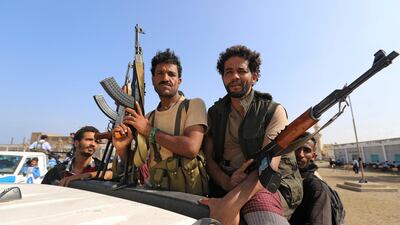A senior official leading humanitarian efforts in Yemen has spoken of the importance of protecting civilians in often complex conflicts.
Juan Carlos Gomez Ramirez, of the International Committee of the Red Cross, described the difficulties he faced in keeping civilian casualties to a minimum.
The civil war in Yemen is now in its fifth year and is estimated to have killed 60,000 people.
Diplomats are struggling to maintain a fragile, three-month ceasefire, with pockets of heavy fighting continuing in the cities of Hodeidah and Taiz.
“When you have to face war it is absolutely key to take into account that you have to protect the civil population,” Mr Gomez Ramirez told a two-day conference in Abu Dhabi entitled "International Law and War in the 21st Century".
“It's in our interest to explain to military commanders that we understand the complexity of their work.
“If the people you are helping do not feel you are doing what you can to protect them, you are not achieving anything.”
Yemen’s conflict began in 2015 after Iran-backed Houthi rebels ousted the internationally recognised governmentof President Abdrabu Mansur Hadi.
In response, Saudi Arabia formed a coalition of nine countries from the Mena region to take on the Houthi militias and restore order.
Aid agencies claim more than 120,000 cases of cholera have been reported already this year, resulting in about 234 deaths.
Mr Gomez Ramirez, the Red Cross delegate for the armed forces in the Arabic Peninsula and a retired Colombian Air Force brigadier general, said work was continuing to persuade Houthi commanders in the field to better protect civilians.
“Knowing the situation in Yemen, it is very difficult to work with the Houthis,” he said.
“I try to prevent the consequences of war by talking to military forces about International Humanitarian Law.
“If you commit too many mistakes you will have all of this population against you because you have lost credibility and support from the civil population.”
Mr Gomez Ramirez said the law was an excellent tool to maintain the safety of civilians.
It is a combination of the Geneva and Hague Conventions, designed to balance humanitarian concerns and military necessity.
It subjects conflict to the rules of law and breaches could be prosecuted as war crimes.

“When I was in Sanaa [Yemen’s capital] we went to the authorities there, who were the Houthis,” Mr Gomez Ramirez said.
“We told them that we wanted to prevent the side-effects of war on the civilian population and if they allowed us to do so, we would help them to prevent it by speaking to military commanders about the IHL.
“Sadly, they told me it was not possible. They don’t believe in us yet so there’s a credibility issue."


